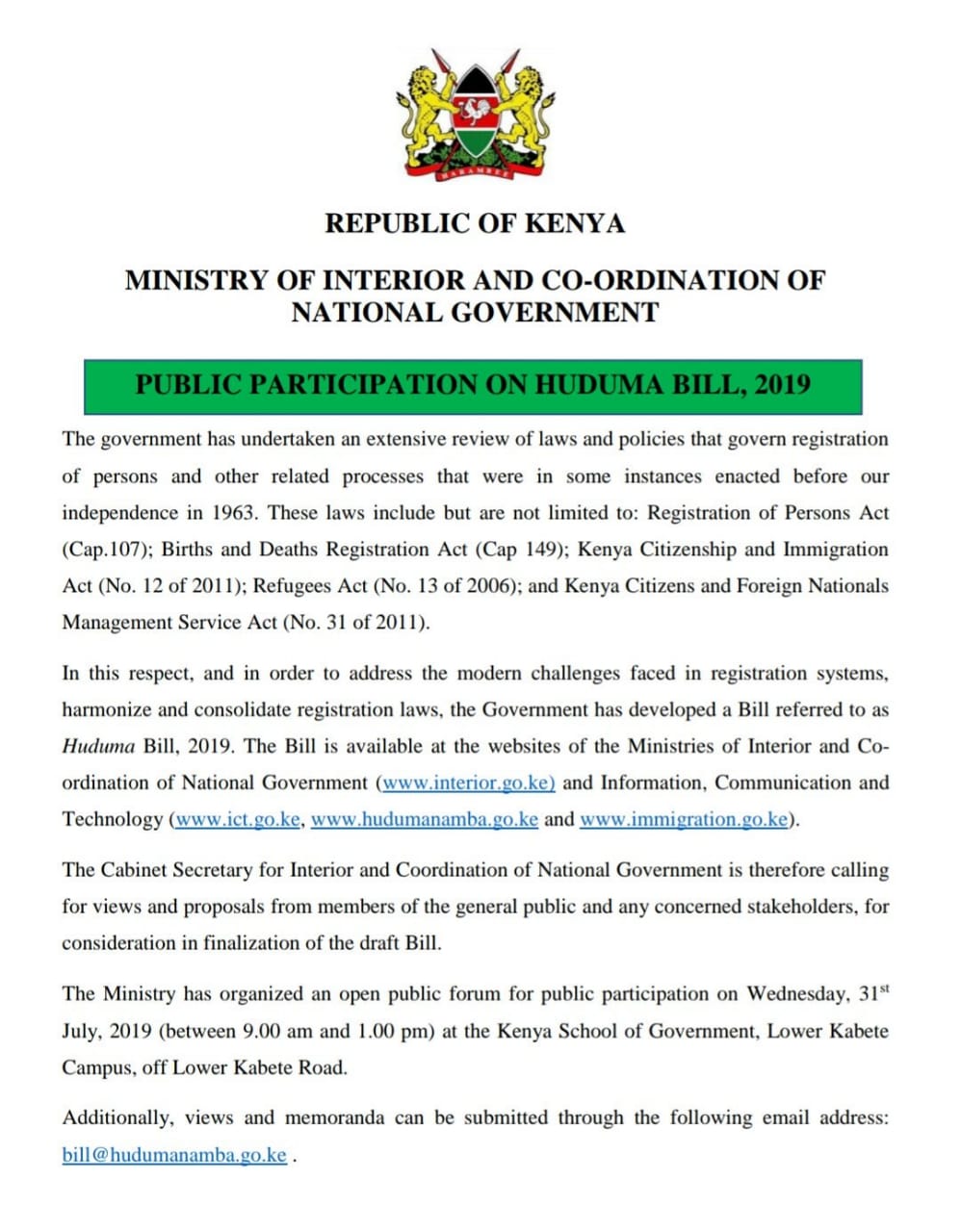
Kenyan citizens will not be able to access government services such as health, education and voting – which they are constitutionally entitled to – without a Huduma Namba. This came to light after a draft of the Huduma Bill 2019 was made available for public comments mid July.
 The proposed bill makes it compulsory for every Kenyan citizen (Section 11(1)) to obtain the Huduma Namba & card despite the law courts, earlier in the year, stating that it should be a voluntary exercise.
The proposed bill makes it compulsory for every Kenyan citizen (Section 11(1)) to obtain the Huduma Namba & card despite the law courts, earlier in the year, stating that it should be a voluntary exercise.
Huduma Namba, also known as the National Integrated Identity Management System (NIIMS), shall be effected immediately once the bill is passed and shall replace many different forms of
already-issued government IDs (Third Schedule (S.68)).
Imagine all your lawfully issued
documents becoming invalid overnight and that chaos that would cause. A better proposal, would be to have a phased-in approach, where a deadline is set for many years in the future, allowing for the linkage of all government-issued IDs to the Huduma Namba. The protracted
deadline will also allow for technical challenges to be resolved in good time and without causing any exclusion.
Consider in particular, the many services (Section 8) for which Huduma Namba would be mandatory and how verification could easily fail due to the lack of robust electricity and internet connectivity. In India, for example, people have been known to die from starvation due
to the inability to access food rations because they either didn’t have an Aadhaar (their version
of the Huduma Namba), or the verification didn’t work.
 Kenyan citizens should be informed on
Kenyan citizens should be informed on
how offline verification of the Huduma Namba will take place. Also, the inclusion of a log on when the Huduma Namba (NIIMS) database is accessed, the name, rank, and department of who accessed the data will aid in creating transparency, accountability and improve oversight
efforts by the Data Protection Authority or other regulators.
Penalties
According to the draft bill, failure to get a Huduma Namba will attract punitive repercussions (Second Schedule (S.56)) such as being jailed for a year and exorbitant fines such as 1 year in
prison and/or a Kshs 1,000,000 fine for a transaction without a Huduma Namba and months in prison and/or a Kshs 500,000 fine for a “general penalty”. All of which, seem wildly disproportionate, especially because the offences that merit a general penalty go undefined in the bill.
On a positive note, it is good to see that the bill does not include National Security’s use of the NIIMS data in the prevention, investigation, prosecution of crime or some other purpose that could be used to justify accessing the database for surveillance. It would, however, be good to strengthen the language across the bill to make it clear that purposes stated are the only lawful purposes for which the NIIMS database may be accessed.
What you can do
You’re invited to submit your views, on the Huduma Bill, through open public forum on Wednesday 31st July 2019 (between 9:00 am and 1 pm) at the Kenya School of Government, Lower Kabete Campus, off Lower Kabete Road. Additionally, views and memoranda can be submitted through the following address bill@hudumanumber.go.ke



















